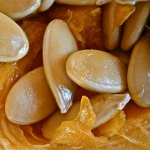 Two weeks ago, on April 17, the open-source seed initiative (OSSI) was launched from the University of Wisconsin, Madison, partly in response to industry giants who dominate the seed industry. Monsanto, Syngenta, and DuPont currently control about half of all commercial seed sales and are rumored to have tried patenting heirloom seeds in addition to the proprietary seeds they have developed for themselves.
Two weeks ago, on April 17, the open-source seed initiative (OSSI) was launched from the University of Wisconsin, Madison, partly in response to industry giants who dominate the seed industry. Monsanto, Syngenta, and DuPont currently control about half of all commercial seed sales and are rumored to have tried patenting heirloom seeds in addition to the proprietary seeds they have developed for themselves.
Contracts from these companies often stipulate that farmers are forbidden from replanting seeds, forcing them to purchase new seeds every season. In response to this situation, OSSI is taking steps to place seeds explicitly into the public domain for use by anyone. The open-source seeds released by OSSI, include varieties of kale, squash, quinoa, zucchini, cress, broccoli, and carrots. They are accompanied by the following pledge:
This Open Source Seed pledge is intended to ensure your freedom to use the seed contained herein in any way you choose, and to make sure those freedoms are enjoyed by all subsequent users. By opening this packet, you pledge that you will not restrict others’ use of these seeds and their derivatives by patents, licenses, or any other means. You pledge that if you transfer these seeds or their derivatives they will also be accompanied by this pledge.
The principle behind the open-source seed initiative follows from the open-source software movement, which is aimed at producing software that can be used and re-used without being taken over by the proprietary rights of any company.
If you have ever bothered to read the end user licensing agreement (EULA) for software installed on your computer, it usually includes many pages of legal jargon detailing, among other things, that you are prohibited from looking at the code to discover how it works. This restriction on discovery is what makes the software proprietary or closed-source. The source-code (instructions that make the program work) is legally protected from any outside scrutiny.
In 1983, in response to increasing prevalence of closed-source software, the open-source software movement, now enjoined by many programmers around the world, began to produce programs, often licensed under the Gnu Public License (GPL), which ensure they will remain free for anyone to examine along with all future versions of those programs. GPL software can never be restricted by anyone, for any reason, ever.
Examples of closed-source software, restricted from public scrutiny, include operating systems like Windows and Apple, as well as programs like Internet Explorer, Safari, Outlook and Outlook Express, Microsoft Office, and Adobe products. However, open-source software is also widely used, including such operating systems as Linux and BSD, and programs like Firefox, Thunderbird, Libre Office, and many others (including all the sofware that runs the NFC website).
The recent Heartbleed bug probably would not have been discovered if it had not been an open-source program that could be reviewed for potential problems.
Even though open-source seeds are not strictly publishing the code of their seeds (i.e. the seed DNA), the initiative is borrowing from the open-source software movement to ensure the code remains open and available for use by anyone and that it will never be restricted or patented.
Making a pledge for open-sourced seeds is a great advancement toward food security.
